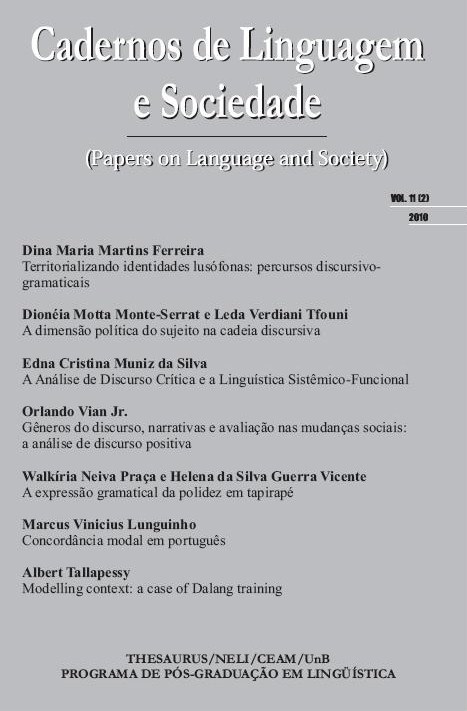Letramento, discurso e gramática funcional
DOI:
https://doi.org/10.26512/les.v11i2.10466Keywords:
New Literacy Studies; The Social Theory of Literacy; Critical Discourse Analysis; Ethnography; Systemic Functional Linguistics.Abstract
This essay aims at providing a proposal of theorizing on the interface between literacy, discourse and functional grammar, through the selection of the Social Theory of Literacy (Barton & Hamilton, 1998; 2000), in the New Literacy Studies, Critical Discourse Analysis (Fairclough, 1992; Chouliaraki & Fairclough, 1999) and Systemic Functional Linguistics (Halliday, 1994). It sets out from a discussion on the possibility of integration between the fields of literacy and discourse and carries on towards a dialogue with ethnography and functional grammar. At the end, some implications of this proposal for discourse and ethnography based literacy research are presented.
Downloads
References
Oxford,
U.K. and Cambridge, U.S.A.: Blackwell, 1994.
Barton, D. & Hamilton, M. Local literacies. London: Routledge, 1998.
. “Literacy practices”. In D. Barton, M. Hamilton, & R. Ivanic
(eds.) Situated Literacies. London: Routledge, 7-15, 2000.
Baynham, M. “Code switching and mode switching: community interpreters
and mediators of literacy”. In: B. Street. Cross-cultural approaches to literacy.
Cambridge: Cambridge University Press, 294-314, 1993.
. Literacy practices. London: Longman, 1995.
. “Narrative as evidence in literacy research”. Linguistics andEducation
11 (2), 99-117, 2000.
BROWN, G. & YULE, G. Discourse analysis. Cambridge: Cambridge
University Press, 1983.
Chouliaraki, L. & Fairclough, N. Discourse in late modernity.
Edinburgh: Edinburgh University Press, 1999.
Fairclough, N. Language and power. London: Longman, 1989.
Fairclough, N. Discourse and social change. Cambridge: Polity Press,
1992.
. Critical Discourse Analysis. London: Longman, 1995.
Fairclough, N. “Multiliteracies and language”. In B. Cope & M.
Kalantzis. Multiliteracies. London: Routledge, 2000.
Fairclough, N. Language, Ideology and Power Research Group Seminar
on Text Analysis. Manuscript, 2001.
GEE, J. Social linguistics and literacies: ideologies in discourses. Basingstoke:
The Falmer Press, Taylor and Francis Inc., 1990.
Halliday, m.a.k. “Categories of the theory of grammar”. Word 17, 1961.
Halliday, M.A.K. Introduction to functional grammar, 2nd edn, London:
Edward Arnold, 1994.
Halliday, M.a.k. & hasan, R. Language, context and text. Aspects of anguage in a social semiotic perspective. Oxford: Oxford University Press,
1985.
Hamilton, m. “Expanding the new literacy studies: using photographs to
explore literacy as social practice”. In D. Barton, M. Hamilton, & R. Ivanic
(eds.) Situated Literacies. London: Routledge, 16-34, 2000.
Heath, S. B. Ways with words: language, life and work in communities and
classrooms. Cambridge: Cambridge University Press, 1983.
Keating, M.C. Routes through literacy: The lived experiences with literacy
of Portuguese women in London. Unpublished Ph.D. thesis, Linguistics
Department, Lancaster University, 2001.
Kress, G. Linguistic processes in sociocultural practice. Oxford: Oxford
University Press, 1989.
Kress, G. & van Leeuwen, T. Multimodal discourse. London: Edward
Arnold, 2001.
Lemke, J. Textual politics. London: Taylor & Francis, 1995.
Magalhães, I. “Práticas discursivas de letramento: a construção da
identidade em relatos de mulheres”. In A. Kleiman (org.) Os significados do
letramento: uma nova perspectiva sobre a prática social da escrita. Campinas,
S.P: Mercado de Letras, 201-235, 1995.
Malinowski, B. Argonauts of the Western Pacific. London: Routledge,
1922.
Martin, J. “Analysing genre: functional parameters.” In F. Christie & J.
Martin (ed.) Genre and institutions. Social processes in the workplace and
school. London: Cassell, 3-39, 1997.
Pitt, K. The discourse of family literacy. Unpublished Ph.D. thesis, Linguistics
Department, Lancaster University, 2001.
RIOS, G. Literacy discourses: a sociocultural critique in Brazilian communities.
Saarbrücken: Verlag Dr Müller, 2009.
Sarangi, S. & Slembrouck, S. Language, bureaucracy and social
control. London: Longman, 1996.
STREET, B. Literacy in theory and practice. Cambridge: Cambridge University
Press, 1984.
(ed). Cross-cultural approaches to literacy. Cambridge: Cambridge University Press, 1993.
. Social literacies. London: Routledge, 1995.
Tusting, K. Written intertextuality and the construction of catholic identity
in parish community: an ethnographic study. Unpublished Ph.D. thesis,
Linguistics Department, Lancaster University, 2000.
Van Leeuwen, T. “Representing social action”. Discourse & Society 6 (1),
81-106, 1995.
Van Leeuwen, T. “The representation of social actors”. In: Carmen R.
Caldas-Coulthard & Malcolm Coulthard. Eds.. Texts and Practices. London/
New York: Routledge, 32-70, 1996.
Wilson, A. Reading a library-writing a book: the significance of literacies
for the prison community. Unpublished Ph.D. thesis, Linguistics Department,
Lancaster University, 1998.



